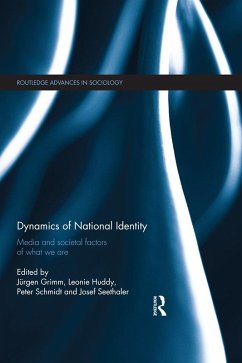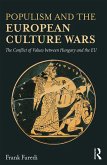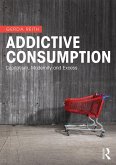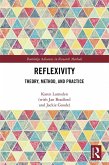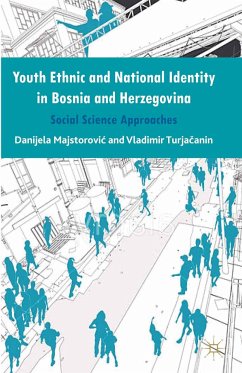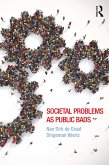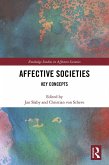Dynamics of National Identity (eBook, PDF)
Media and Societal Factors of What We Are
Redaktion: Grimm, Jürgen; Seethaler, Josef; Schmidt, Peter; Huddy, Leonie
42,95 €
42,95 €
inkl. MwSt.
Sofort per Download lieferbar

21 °P sammeln
42,95 €
Als Download kaufen

42,95 €
inkl. MwSt.
Sofort per Download lieferbar

21 °P sammeln
Jetzt verschenken
Alle Infos zum eBook verschenken
42,95 €
inkl. MwSt.
Sofort per Download lieferbar
Alle Infos zum eBook verschenken

21 °P sammeln
Dynamics of National Identity (eBook, PDF)
Media and Societal Factors of What We Are
Redaktion: Grimm, Jürgen; Seethaler, Josef; Schmidt, Peter; Huddy, Leonie
- Format: PDF
- Merkliste
- Auf die Merkliste
- Bewerten Bewerten
- Teilen
- Produkt teilen
- Produkterinnerung
- Produkterinnerung

Bitte loggen Sie sich zunächst in Ihr Kundenkonto ein oder registrieren Sie sich bei
bücher.de, um das eBook-Abo tolino select nutzen zu können.
Hier können Sie sich einloggen
Hier können Sie sich einloggen
Sie sind bereits eingeloggt. Klicken Sie auf 2. tolino select Abo, um fortzufahren.

Bitte loggen Sie sich zunächst in Ihr Kundenkonto ein oder registrieren Sie sich bei bücher.de, um das eBook-Abo tolino select nutzen zu können.
Globalization, immigration and economic crisis challenge the conceptions of nations, trans-national institutions and post-ethnic societies which are central topics in social sciences' discourses. This book examines in an interdisciplinary and international comparative way structures of national identity which are in conflict with or supporting multi-ethnic diversity and trans-national connectivity.
- Geräte: PC
- mit Kopierschutz
- eBook Hilfe
- Größe: 4.53MB
Andere Kunden interessierten sich auch für
![Populism and the European Culture Wars (eBook, PDF) Populism and the European Culture Wars (eBook, PDF)]() Frank FurediPopulism and the European Culture Wars (eBook, PDF)39,95 €
Frank FurediPopulism and the European Culture Wars (eBook, PDF)39,95 €![Addictive Consumption (eBook, PDF) Addictive Consumption (eBook, PDF)]() Gerda ReithAddictive Consumption (eBook, PDF)40,95 €
Gerda ReithAddictive Consumption (eBook, PDF)40,95 €![Reflexivity (eBook, PDF) Reflexivity (eBook, PDF)]() Karen LumsdenReflexivity (eBook, PDF)42,95 €
Karen LumsdenReflexivity (eBook, PDF)42,95 €![Youth Ethnic and National Identity in Bosnia and Herzegovina (eBook, PDF) Youth Ethnic and National Identity in Bosnia and Herzegovina (eBook, PDF)]() Danijela MajstorovicYouth Ethnic and National Identity in Bosnia and Herzegovina (eBook, PDF)73,95 €
Danijela MajstorovicYouth Ethnic and National Identity in Bosnia and Herzegovina (eBook, PDF)73,95 €![Societal Problems as Public Bads (eBook, PDF) Societal Problems as Public Bads (eBook, PDF)]() Nan de GraafSocietal Problems as Public Bads (eBook, PDF)39,95 €
Nan de GraafSocietal Problems as Public Bads (eBook, PDF)39,95 €![Affective Societies (eBook, PDF) Affective Societies (eBook, PDF)]() Affective Societies (eBook, PDF)40,95 €
Affective Societies (eBook, PDF)40,95 €![A Filtered Life (eBook, PDF) A Filtered Life (eBook, PDF)]() Nicole TaylorA Filtered Life (eBook, PDF)27,95 €
Nicole TaylorA Filtered Life (eBook, PDF)27,95 €-
-
-
Globalization, immigration and economic crisis challenge the conceptions of nations, trans-national institutions and post-ethnic societies which are central topics in social sciences' discourses. This book examines in an interdisciplinary and international comparative way structures of national identity which are in conflict with or supporting multi-ethnic diversity and trans-national connectivity.
Dieser Download kann aus rechtlichen Gründen nur mit Rechnungsadresse in A, B, BG, CY, CZ, D, DK, EW, E, FIN, F, GR, HR, H, IRL, I, LT, L, LR, M, NL, PL, P, R, S, SLO, SK ausgeliefert werden.
Produktdetails
- Produktdetails
- Verlag: Taylor & Francis eBooks
- Seitenzahl: 382
- Erscheinungstermin: 12. Februar 2016
- Englisch
- ISBN-13: 9781317597360
- Artikelnr.: 44777998
- Verlag: Taylor & Francis eBooks
- Seitenzahl: 382
- Erscheinungstermin: 12. Februar 2016
- Englisch
- ISBN-13: 9781317597360
- Artikelnr.: 44777998
- Herstellerkennzeichnung Die Herstellerinformationen sind derzeit nicht verfügbar.
Jürgen Grimm is Professor of Communication Studies at the University of Vienna. Leonie Huddy is Professor at the Department of Political Science at Stony Brook University, New York. Peter Schmidt is Professor emeritus at the Department of Political Science, University of Giessen, and State Research University Higher School of Economics (HSE), Moscow. Josef Seethaler is Deputy Director of the Institute for Comparative Media and Communication Studies at the Austrian Academy of Sciences and the University of Klagenfurt.
1. Introduction, (Jürgen Grimm, Leonie Huddy, Peter Schmidt and Josef
Seethaler)
Part I: Conceptualizing National Identity
2. Unifying National Identity Research: Interdisciplinary perspectives, (
Leonie Huddie)
3. Identification with Groups and National Identity: Applying
Multidimensional Models of Group Identification to National Identification,
(Sonja Roccas and Avihay Berlin)
4. Dimensional Differences between Nationalism and Patriotism, (
Horst-Alfred Heinrich)
5. National Identity and Exclusion of Non-ethnic Migrants: Germany and
Israel in Comparative Perspective, (Oshrat Hochman, Rebeca Raijman and
Peter Schmidt)
6. Grounded and Normative Dimensions of National Pride in Comparative
Perspective, (Marharyta Fabrykant and Vladimir Magun)
Part II: National Identity, Multi-Cultural Societies, and Supra-National
Integration
7. Exit, Voice, and the Impact of Regional, National, and European
Identification: An Integration and Empirical Test of Albert Hirschman's
Theory and the Theory of Collective Action, (Karl-Dieter Opp)
8. Perceived Discrimination, Modes of Collective Belonging and Self-Esteem
Among Descendants of Immigrants in Austria and Germany, (Rossalina Latcheva
and Barbara Herzog-Punzenberger)
9. Social-Cultural Milieus And National Identification Of Second Generation
Migrant Youth in Austria, (Hildegard Weiss)
10. Critical Views of the Nation, National Attachment, and Attitudes toward
Immigrants in Switzerland, (Oriane Sarrasin, Eva G. T. Green and Nicole
Fasel)
11. National Identity and Ant-Immigrant Attitudes: The case of Russia, (
Lusine K. Grigoryan)
12. European Identity as a Safeguard against Xenophobia? A Differentiated
View Based on Identity Content, (Georg Datler)
13. National and Europe
Seethaler)
Part I: Conceptualizing National Identity
2. Unifying National Identity Research: Interdisciplinary perspectives, (
Leonie Huddie)
3. Identification with Groups and National Identity: Applying
Multidimensional Models of Group Identification to National Identification,
(Sonja Roccas and Avihay Berlin)
4. Dimensional Differences between Nationalism and Patriotism, (
Horst-Alfred Heinrich)
5. National Identity and Exclusion of Non-ethnic Migrants: Germany and
Israel in Comparative Perspective, (Oshrat Hochman, Rebeca Raijman and
Peter Schmidt)
6. Grounded and Normative Dimensions of National Pride in Comparative
Perspective, (Marharyta Fabrykant and Vladimir Magun)
Part II: National Identity, Multi-Cultural Societies, and Supra-National
Integration
7. Exit, Voice, and the Impact of Regional, National, and European
Identification: An Integration and Empirical Test of Albert Hirschman's
Theory and the Theory of Collective Action, (Karl-Dieter Opp)
8. Perceived Discrimination, Modes of Collective Belonging and Self-Esteem
Among Descendants of Immigrants in Austria and Germany, (Rossalina Latcheva
and Barbara Herzog-Punzenberger)
9. Social-Cultural Milieus And National Identification Of Second Generation
Migrant Youth in Austria, (Hildegard Weiss)
10. Critical Views of the Nation, National Attachment, and Attitudes toward
Immigrants in Switzerland, (Oriane Sarrasin, Eva G. T. Green and Nicole
Fasel)
11. National Identity and Ant-Immigrant Attitudes: The case of Russia, (
Lusine K. Grigoryan)
12. European Identity as a Safeguard against Xenophobia? A Differentiated
View Based on Identity Content, (Georg Datler)
13. National and Europe
1. Introduction, (Jürgen Grimm, Leonie Huddy, Peter Schmidt and Josef
Seethaler)
Part I: Conceptualizing National Identity
2. Unifying National Identity Research: Interdisciplinary perspectives, (
Leonie Huddie)
3. Identification with Groups and National Identity: Applying
Multidimensional Models of Group Identification to National Identification,
(Sonja Roccas and Avihay Berlin)
4. Dimensional Differences between Nationalism and Patriotism, (
Horst-Alfred Heinrich)
5. National Identity and Exclusion of Non-ethnic Migrants: Germany and
Israel in Comparative Perspective, (Oshrat Hochman, Rebeca Raijman and
Peter Schmidt)
6. Grounded and Normative Dimensions of National Pride in Comparative
Perspective, (Marharyta Fabrykant and Vladimir Magun)
Part II: National Identity, Multi-Cultural Societies, and Supra-National
Integration
7. Exit, Voice, and the Impact of Regional, National, and European
Identification: An Integration and Empirical Test of Albert Hirschman's
Theory and the Theory of Collective Action, (Karl-Dieter Opp)
8. Perceived Discrimination, Modes of Collective Belonging and Self-Esteem
Among Descendants of Immigrants in Austria and Germany, (Rossalina Latcheva
and Barbara Herzog-Punzenberger)
9. Social-Cultural Milieus And National Identification Of Second Generation
Migrant Youth in Austria, (Hildegard Weiss)
10. Critical Views of the Nation, National Attachment, and Attitudes toward
Immigrants in Switzerland, (Oriane Sarrasin, Eva G. T. Green and Nicole
Fasel)
11. National Identity and Ant-Immigrant Attitudes: The case of Russia, (
Lusine K. Grigoryan)
12. European Identity as a Safeguard against Xenophobia? A Differentiated
View Based on Identity Content, (Georg Datler)
13. National and Europe
Seethaler)
Part I: Conceptualizing National Identity
2. Unifying National Identity Research: Interdisciplinary perspectives, (
Leonie Huddie)
3. Identification with Groups and National Identity: Applying
Multidimensional Models of Group Identification to National Identification,
(Sonja Roccas and Avihay Berlin)
4. Dimensional Differences between Nationalism and Patriotism, (
Horst-Alfred Heinrich)
5. National Identity and Exclusion of Non-ethnic Migrants: Germany and
Israel in Comparative Perspective, (Oshrat Hochman, Rebeca Raijman and
Peter Schmidt)
6. Grounded and Normative Dimensions of National Pride in Comparative
Perspective, (Marharyta Fabrykant and Vladimir Magun)
Part II: National Identity, Multi-Cultural Societies, and Supra-National
Integration
7. Exit, Voice, and the Impact of Regional, National, and European
Identification: An Integration and Empirical Test of Albert Hirschman's
Theory and the Theory of Collective Action, (Karl-Dieter Opp)
8. Perceived Discrimination, Modes of Collective Belonging and Self-Esteem
Among Descendants of Immigrants in Austria and Germany, (Rossalina Latcheva
and Barbara Herzog-Punzenberger)
9. Social-Cultural Milieus And National Identification Of Second Generation
Migrant Youth in Austria, (Hildegard Weiss)
10. Critical Views of the Nation, National Attachment, and Attitudes toward
Immigrants in Switzerland, (Oriane Sarrasin, Eva G. T. Green and Nicole
Fasel)
11. National Identity and Ant-Immigrant Attitudes: The case of Russia, (
Lusine K. Grigoryan)
12. European Identity as a Safeguard against Xenophobia? A Differentiated
View Based on Identity Content, (Georg Datler)
13. National and Europe
